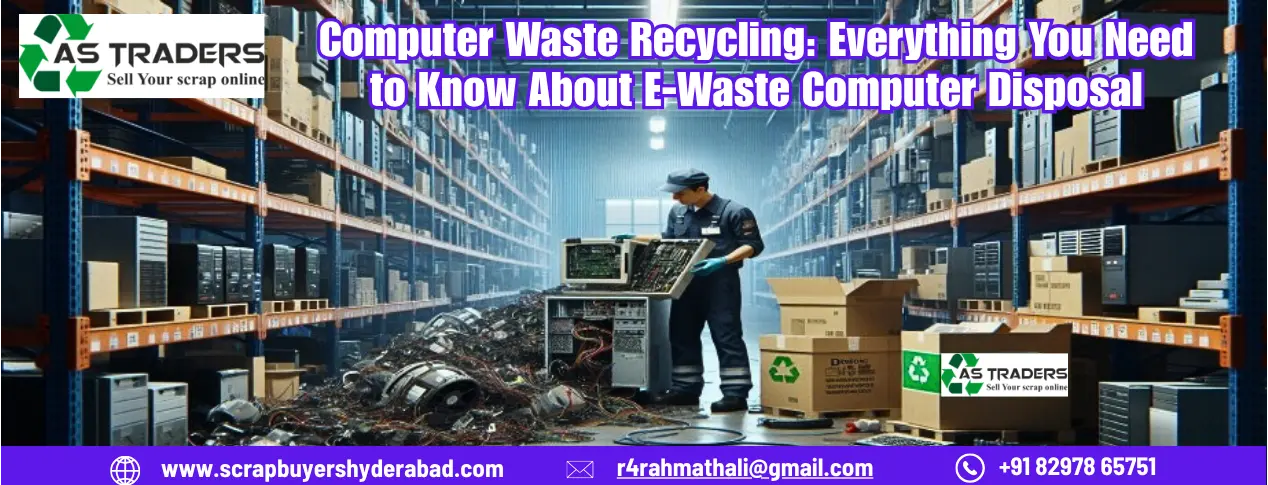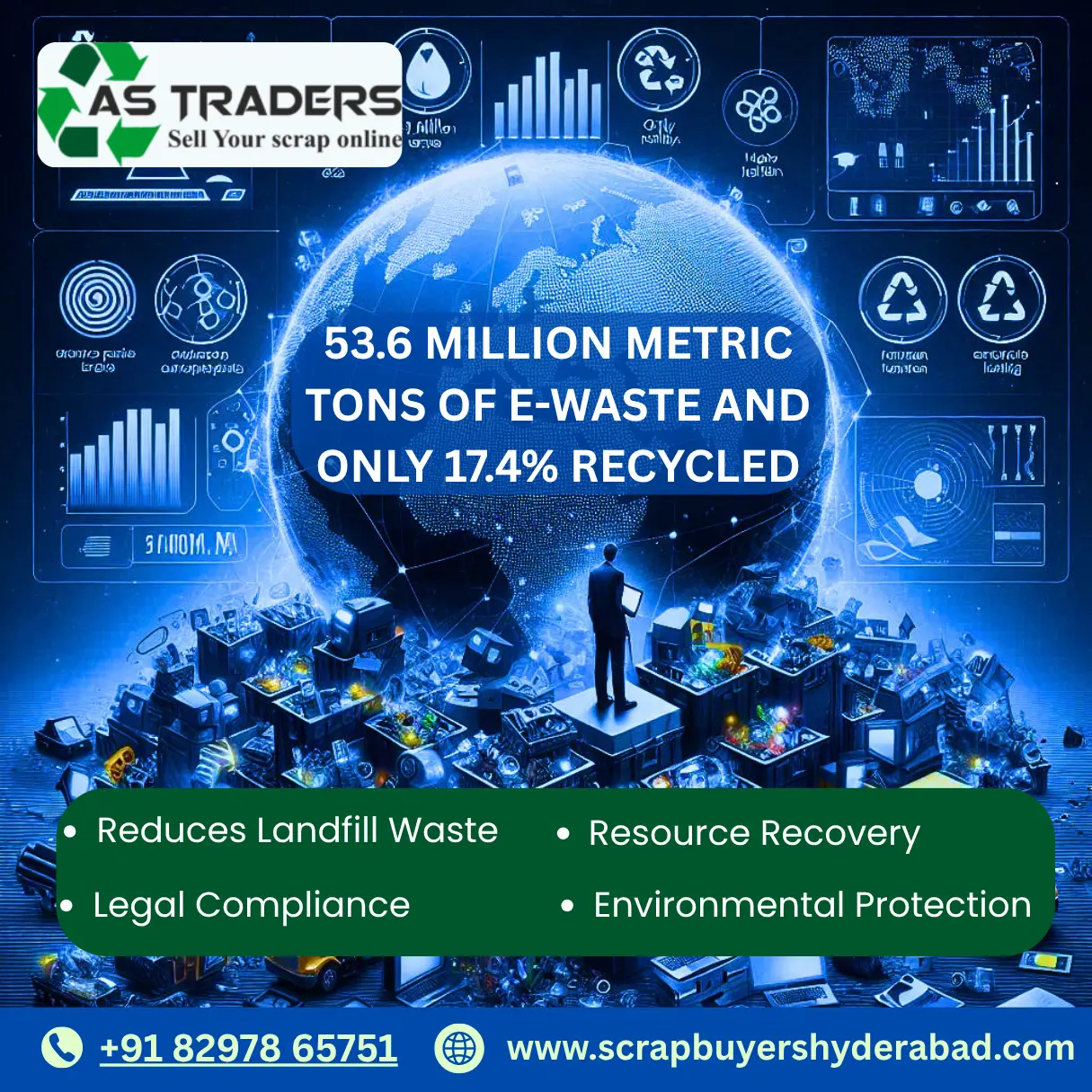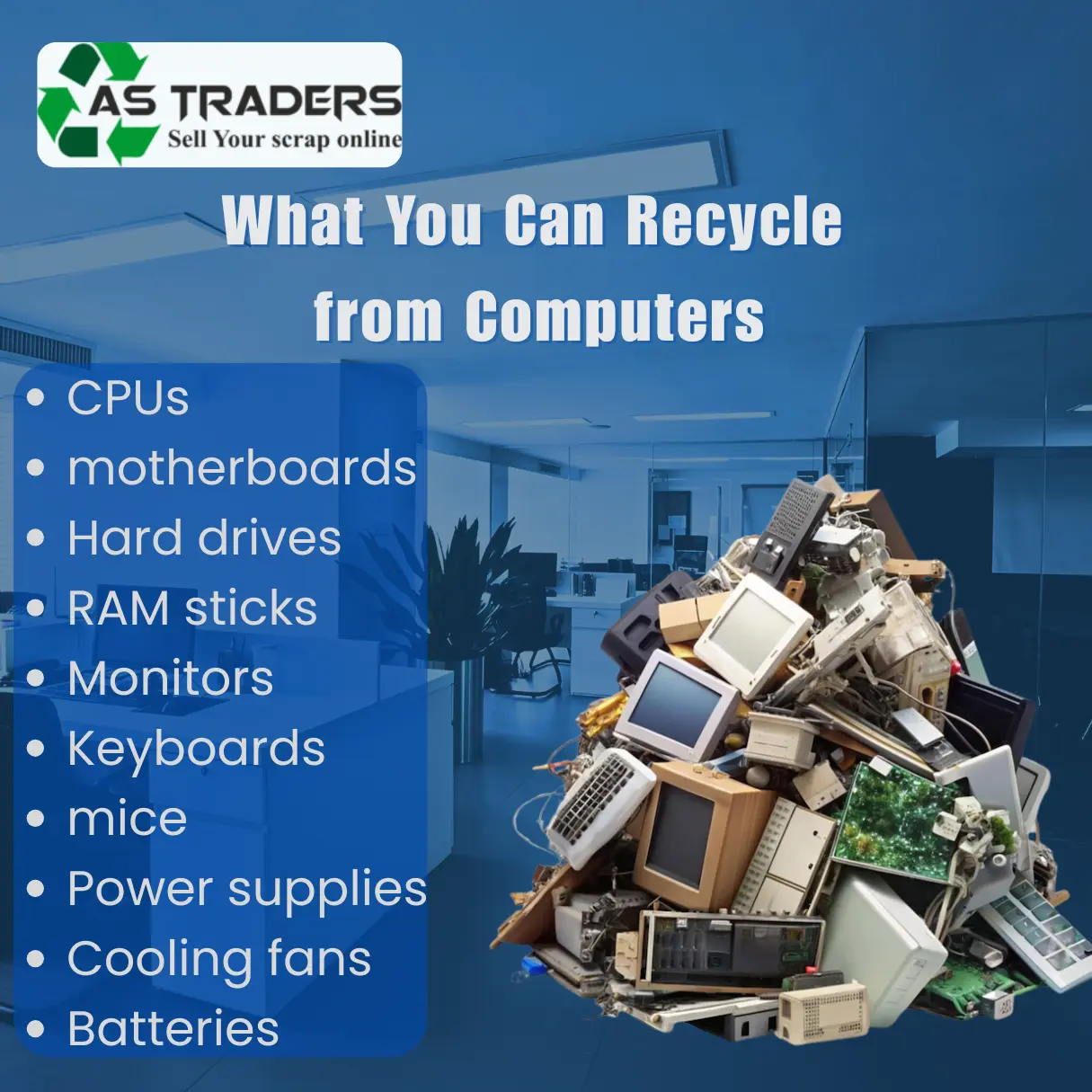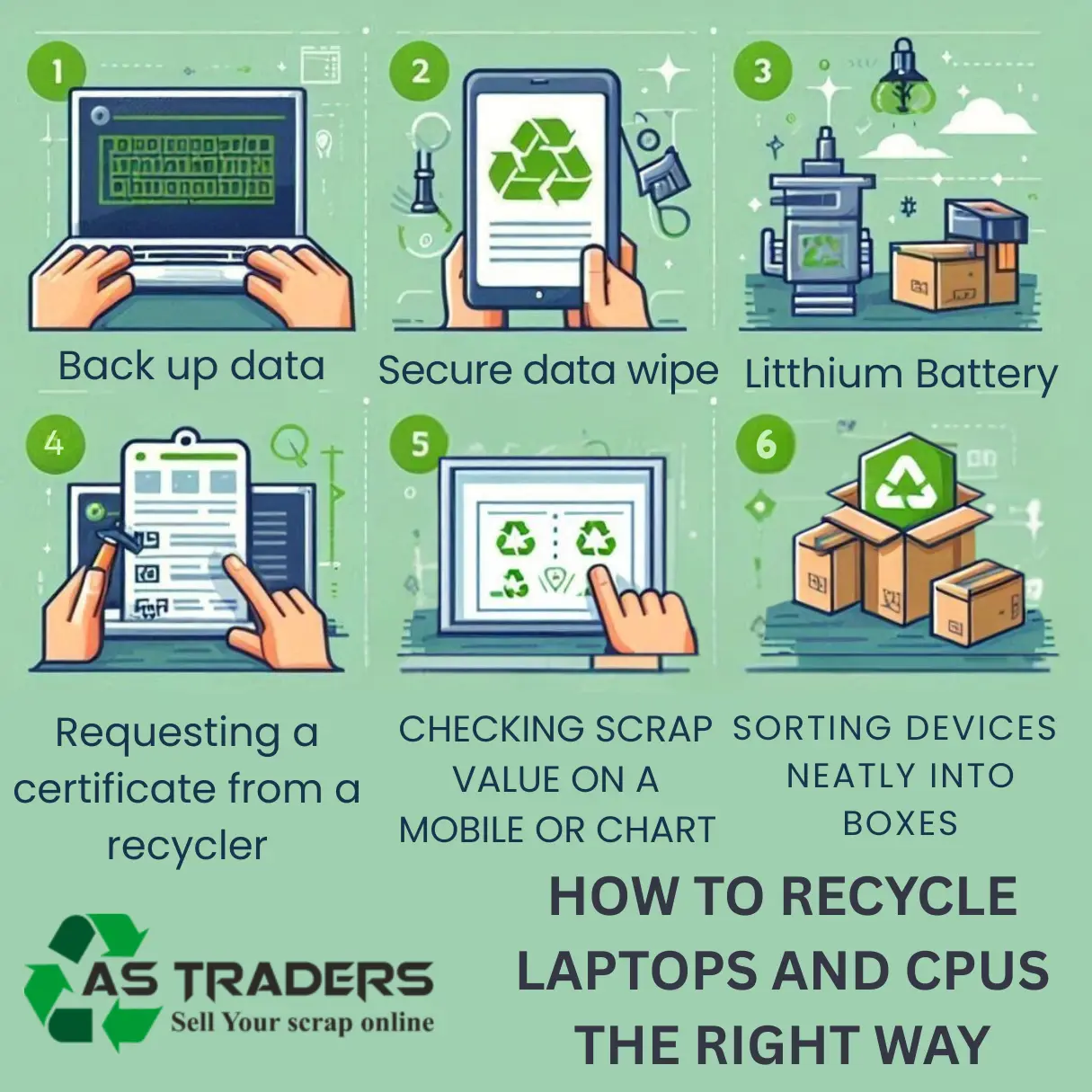
How Computer Waste Recycling Works: From E-Waste to Scrap Value
In the digital age, we constantly upgrade our devices, replacing old computers with newer models every few years. But what happens to the outdated systems? The answer lies in computer waste recycling, a vital process that not only helps in managing electronic waste but also safeguards our environment. In this comprehensive guide, we’ll walk you through everything you need to know about recycling of computer waste, its environmental impact, the value it offers through scrap recovery, and where you can recycle your old machines responsibly.
What is Computer Waste?
Computer waste, also known as electronic waste or e-waste, includes discarded computer devices such as desktops, laptops, CPUs, monitors, printers, and peripherals. As technology advances rapidly, tons of electronic devices become obsolete every year. The improper disposal of these electronics contributes to soil, water, and air pollution.
Computers contain a range of components made from metals, plastics, and glass, many of which are hazardous if not handled correctly. For example, heavy metals like lead, mercury, and cadmium can leak into the environment from dumped e-waste.

The Growing Problem of E-Waste
According to the Global E-Waste Monitor 2020, the world generated over 53 million metric tons of e-waste in 2019, with only 17% being recycled properly. India is the third largest producer of e-waste globally, and much of this waste consists of computer components.
Without proper e waste computer recycling, the potential environmental and health consequences are severe:
- Toxic substances entering water bodies
- Air pollution due to burning components
- Unregulated dismantling causing worker health issues
This is why waste computer recycling has become a top priority worldwide.
“The world generated 53.6 million metric tons of e-waste in 2019, and only 17.4% was formally collected and recycled.”
-Global E-Waste Monitor 2020, United Nations University
Why is Computer Waste Recycling Important?
Computer waste recycling is crucial for several reasons:
- Environmental Protection: Prevents toxic materials from leaching into soil and groundwater.
- Resource Recovery: Recovers valuable metals like gold, silver, and copper from computer components.
- Reduces Landfill Waste: Electronics take up significant landfill space and degrade slowly.
- Legal Compliance: In India and many countries, it is illegal to discard e-waste with general trash.
Many recyclers offer services to safely dismantle, recycle, and refurbish computers, ensuring safe and eco-friendly handling.
“India’s E-Waste Management Rules mandate that producers must ensure proper disposal and collection, encouraging recyclers to be formally registered.”
-The Hindu BusinessLine
How the Recycling of Computer Waste Works
The recycling of computer waste is a multi step process designed to extract maximum usable material while safely disposing of hazardous parts.
1. Collection and Transportation
Old computers are collected from homes, businesses, or drop off points and transported to recycling centers.
2. Sorting and Dismantling
Devices are manually disassembled to separate plastic, metal, and circuit boards. Some reusable parts like RAM or hard drives are refurbished.
3. Data Destruction
Before recycling, hard drives are wiped clean or destroyed to ensure no personal data is leaked.
4. Shredding and Material Separation
Components are shredded and separated using magnets, eddy currents, and water based separation systems to isolate metals, plastics, and glass.
5. Recovery and Resale
Precious metals are extracted and sold. Functional parts are refurbished and resold. Hazardous components are disposed of according to environmental regulations.
What You Can Recycle from Computers
Some of the most commonly recycled parts include:
- CPUs and motherboards (contain gold and copper)
- Hard drives
- RAM sticks
- Monitors
- Keyboards and mice
- Power supplies
- Cooling fans
- Batteries (must be handled separately)
Every part has some value, making computer recycling economically viable for scrap it metal prices collectors and buyers.
The Value of Scrap: Understanding Scrap It Metal Prices
Scrap it metal prices refer to the market value of recyclable metals found in computer components. Prices can vary depending on demand, purity, and type of metal.
| Component | Metal Recovered | Average Scrap Price (INR/kg) |
|---|---|---|
| CPU | Gold, Copper | ₹700 – ₹1200 |
| Motherboard | Copper, Silver | ₹250 – ₹400 |
| Hard Drive | Aluminum, Rare Earth | ₹100 – ₹200 |
| Power Supply | Copper, Steel | ₹80 – ₹150 |
| Wires and Cables | Copper | ₹300 – ₹500 |
These prices make computer scrap a valuable commodity for scrap buyers and recyclers.
Where to Recycle: Finding an E-Waste Center Near You
One of the most common search terms from individuals looking to dispose of their old devices is “e waste center near me”. Finding a reliable and certified e-waste collection center ensures your electronics are handled safely and legally.
Tips to Find a Good E-Waste Recycling Center:
-
Use Google Maps or Search Engines: Type in “e waste center near me” or “computer recycling center near me.”
-
Check Certification: Look for recyclers approved by pollution control boards or certified under the E-Waste Management Rules.
-
Doorstep Pickup: Many companies now offer convenient pickup services for bulk or residential e-waste.
-
Transparency: Ensure the center follows proper recycling processes and offers proof of responsible disposal.
Using local centers not only supports legal disposal but also contributes to cleaner neighborhoods and reduces illegal dumping.
How to Get the Best Scrap Price for Your Old Computers
If you are planning to dispose of or sell your outdated devices, understanding scrap it metal prices and how to maximize returns is key.
1. Know What You’re Selling
-
Identify the make and model of your computer.
-
Older CPUs and motherboards may contain more gold and copper than newer, lightweight models.
2. Check Current Scrap Rates
Scrap prices fluctuate daily. Visit local scrap portals or call your local e waste center near me to ask about current CPU scrap prices and motherboard rates.
3. Sell in Bulk
Scrap buyers offer better rates for bulk quantities. Offices and institutions with large computer inventories can negotiate higher prices.
4. Keep Accessories Together
Items like keyboards, wires, power cables, and external drives also have value. A complete unit fetches a better rate.
5. Ensure Data is Wiped
Destroy or erase hard drives to protect your personal or business data. Some scrap companies offer certified data destruction.
Computer Waste Recycling Laws in India
India’s E-Waste (Management) Rules, enforced by the Ministry of Environment, Forest and Climate Change, regulate how electronic waste should be collected and recycled.
Key Legal Points:
-
Manufacturers and importers are responsible for collecting and recycling the e-waste generated by their products.
-
Bulk consumers, such as offices and educational institutions, must maintain records of e-waste generation and disposal.
-
Authorized recyclers must comply with strict environmental standards.
-
Informal recycling (done by unauthorized street vendors or dismantlers) is punishable under law.
As a consumer or business, it’s important to choose authorized scrap buyers who comply with these regulations. This ensures you avoid fines and contribute to sustainable practices.
Why You Should Avoid Informal Scrap Buyers
Although it might seem convenient, selling to informal or unauthorized scrap dealers can be risky.
-
No data destruction assurance
-
No environmentally responsible recycling
-
Contributes to illegal dumping and pollution
-
No fair pricing based on accurate scrap it metal prices
By opting for certified computer waste recycling services, you support green practices and get better value for your materials.
“Only 468 authorized dismantlers and recyclers operate across India, while thousands of informal recyclers handle 90% of the waste unscientifically.”
-IndiaSpend
Sustainable Impact of Waste Computer Recycling
Here’s a breakdown of the positive outcomes when you engage in waste computer recycling with certified scrap companies:
| Benefit | Impact |
|---|---|
| Reduction of e-waste in landfills | Conserves space and minimizes toxic leachate |
| Recovery of valuable metals | Supports circular economy and reduces mining |
| Lower carbon footprint | Saves energy compared to raw material production |
| Job creation | Promotes green jobs in recycling and refurbishing |
| Promotes digital inclusion | Refurbished systems are donated to schools/NGOs |
Case Study: A Company That Reduced 2 Tons of E-Waste
A mid-sized IT firm in Bangalore partnered with a certified e-waste recycler for regular disposal of old computers. In one year, the company recycled:
-
80 desktops
-
45 laptops
-
100+ peripherals (monitors, routers, cables)
Results:
-
Saved 2 tons of e-waste from landfills
-
Recovered valuable parts worth ₹75,000
-
Received legal documentation for compliance
-
Supported NGO with 10 refurbished laptops for students
This is the power of responsible recycling of computer waste – it benefits not only the environment but also the community.
“India generated 1.6 million tonnes of e-waste in 2021 – 22, but only about 22.7% of it was collected and processed.”
– Down To Earth, Centre for Science and Environment (CSE)
Pro Tip: Schedule Regular Pickups with a Trusted Scrap Partner
Businesses and institutions should sign up with authorized e-waste collection companies for periodic pickups. This ensures:
-
You always stay compliant with e-waste laws
-
You receive the best computer scrap rates
-
Your inventory remains clean and efficient
-
Environmental reports for CSR tracking are available
The Circular Economy and Computer Waste Recycling
The concept of a circular economy emphasizes keeping resources in use for as long as possible. When applied to computer waste recycling, it means reducing reliance on raw material extraction by maximizing reuse, refurbishment, and responsible recovery of valuable elements like copper, aluminum, and gold from electronic devices.
This approach minimizes waste generation and creates a sustainable loop where used materials are returned to production. It is especially relevant for e waste computer recycling, as electronic components are rich in recoverable resources that can be fed back into the manufacturing cycle.
By adopting a circular economy mindset:
-
Fewer devices end up in landfills
-
Natural resource depletion is slowed
-
New industries are created around repair, refurbishing, and recovery
Businesses and individuals who contribute to the recycling of computer waste help reduce environmental damage and create value from what would otherwise be discarded.
How IT Companies and Offices Can Lead the Change
The tech industry produces some of the largest volumes of electronic waste. However, it also holds the greatest potential for positive change. Here’s how companies, particularly those in IT, BPOs, and education sectors can lead in waste computer recycling:
-
Adopt clear e-waste management policies internally, including safe disposal processes
-
Schedule routine pickups with certified recyclers for old computers, CPUs, and peripherals
-
Maintain inventory logs to track equipment lifecycle and plan end of use recycling
-
Donate refurbished systems to NGOs or underprivileged schools
-
Work with certified recyclers only to ensure environmental compliance and avoid legal issues
By taking these steps, companies not only support sustainability goals but also build credibility through transparent operations. Several CSR initiatives now prioritize contributions to computer waste recycling as part of ESG (Environmental, Social, Governance) reporting.
Future Trends in Computer Waste Management
The landscape of e waste computer recycling is evolving fast. Governments, tech innovators, and recyclers are investing in smarter, safer, and more efficient recycling technologies. Here are some key trends shaping the future:
-
Artificial Intelligence in Sorting
Advanced AI and robotics are being used to identify and sort components like motherboards and CPUs faster and more accurately than manual labor. -
Product-as-a-Service (PaaS) Models
Some companies are shifting to leasing computers instead of purchasing them outright, ensuring devices are returned and recycled at end of life. -
Digital Tracking of E-Waste
Blockchain based systems are emerging to track every piece of e-waste from source to recycling, reducing illegal dumping and improving transparency. -
Mandatory Producer Responsibility
Governments are enforcing Extended Producer Responsibility (EPR) rules that require manufacturers to take back and recycle their own products responsibly. -
Urban Mining
The concept of “urban mining” refers to extracting rare materials from discarded electronics rather than from the earth. This is becoming a viable and profitable method of recovering resources.
These changes will further standardize the recycling of computer waste, increase scrap value transparency, and make computer waste recycling more accessible and regulated.
Final Call to Action: Act Now, Recycle Responsibly
Whether you are a business managing dozens of outdated CPUs or a household with an unused laptop, your action matters. With certified e waste computer recycling services now widely available, responsible disposal is easier than ever.
-
Know your options for collection and disposal
-
Understand current scrap it metal prices for maximum value
-
Choose legal, authorized recyclers in your area
-
Help promote the circular economy by recycling and reusing computer parts
By doing so, you reduce your carbon footprint, protect natural resources, and contribute to a cleaner and more sustainable digital future.
Common Myths About Computer Recycling
Even though computer waste recycling is gaining awareness, several myths still keep people from participating actively. Let’s bust a few of them:
Myth 1: “It’s Illegal to Sell or Recycle Old Computers”
Reality: It is perfectly legal to sell or recycle computers as long as it is done through certified and authorized e-waste companies. In fact, doing so is encouraged under India’s E-Waste Management Rules.
Myth 2: “Recycling is Too Expensive”
Reality: Most e waste computer recycling centers offer free pickups, and some even pay you based on scrap it metal prices. You not only get rid of unwanted waste responsibly but also earn from it.
Myth 3: “There’s No Value in Old Electronics”
Reality: Old CPUs, motherboards, and RAM often contain gold, copper, aluminum, and other valuable materials. These components can fetch a decent price.
Myth 4: “My Data Will Be Stolen During Recycling”
Reality: Authorized recyclers ensure complete data destruction through certified processes, including physical destruction or advanced wiping.
How to Recycle Laptops and CPUs the Right Way
Recycling your laptop or CPU doesn’t have to be complicated. Follow these steps to do it right:
-
Backup Your Data
-
Save all important files, passwords, and documents.
-
-
Erase Hard Drives
-
Use tools like DBAN (Darik’s Boot and Nuke) or have the recycler offer certified destruction.
-
-
Remove Batteries
-
Lithium batteries need separate handling and can be hazardous if broken.
-
-
Sort and Pack
-
If you have multiple items, sort and box them neatly for pickup or drop off.
-
-
Request Certificate
-
For businesses, always ask for a certificate of recycling for compliance and CSR records.
-
-
Check Scrap Value
-
Compare scrap it metal prices before finalizing a sale to ensure you’re getting a fair deal.
-
Frequently Asked Questions (FAQs)
Q1: What items can I recycle under computer waste?
A: Desktops, laptops, CPUs, hard drives, monitors, RAM, motherboards, cables, batteries, and peripherals like keyboards and mice.
Q2: Can I sell my old, non-working computer?
A: Yes. Even non working systems have valuable scrap like aluminum, copper, and gold.
Q3: How do I find a trusted e waste center near me?
A: Google “e waste center near me” or check with your city’s pollution control board for certified partners.
Q4: Do recyclers collect from home?
A: Yes. Many authorized recyclers offer free or low cost doorstep pickup, especially for bulk items.
Q5: What’s the average CPU scrap price?
A: As of 2025, CPU scrap can fetch between ₹700 – ₹1200 per kg depending on market conditions.
Q6: Is computer waste hazardous to the environment?
A: Yes. Components like batteries, motherboards, and CRT monitors contain heavy metals and toxic chemicals. Improper disposal can contaminate soil and water.
Q7: Can I recycle my laptop battery with my old computer?
A: Laptop batteries must be handled separately. Most e waste computer recycling centers accept them but follow special processes for lithium ion battery recycling.
Q8: How often should businesses recycle old computers?
A: It depends on usage, but ideally every 3 – 5 years. Many companies schedule annual audits and hand over bulk systems to certified waste computer recycling partners.
Q9: What are the risks of using informal or uncertified recyclers?
A: Informal recyclers may mishandle hazardous parts, burn components, and leak data. This is unsafe for the environment and violates e-waste laws in India.
Q10: Can I earn money by selling old computers as scrap?
A: Yes. Many recyclers offer cash based on scrap it metal prices for CPUs, motherboards, hard drives, and more. Bulk sellers may get higher rates.
Final Thoughts: Let’s Close the Loop
Computer waste recycling is no longer a “nice to do” but a “must do” for anyone using electronics. By opting for proper e waste computer recycling, you are:
-
Preventing environmental pollution
-
Conserving valuable natural resources
-
Helping create a sustainable economy
-
Supporting ethical businesses and regulations
Whether you’re a household disposing of one laptop or a company clearing out 100 systems, every effort counts. Don’t wait for the devices to pile up.
📍Act now:
-
Search for a trusted e waste center near me
-
Understand today’s scrap it metal prices
-
Call a certified recycler
-
Recycle smartly and responsibly


